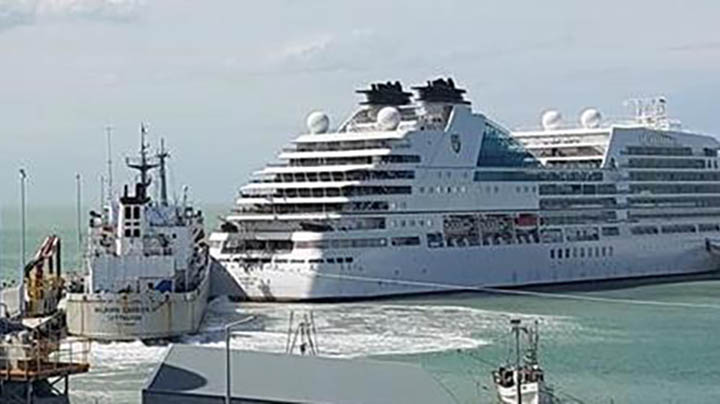
Port authorities across New Zealand have been warned of the need to ensure that they have the infrastructure to handle large vessels following an incident in which a 41,865gt cruiseship broke free from its moorings and struck a nearby vessel.
The Bahamas-flagged Seabourn Encore sustained shell plating damage when it collided with a bulk cement carrier after bollards failed and mooring lines broke in winds gusting up to 45 knots in February 2017.
The NZ Transport Accident Investigation Commission (TAIC) found that the company running the port of Timaru 'had virtually no knowledge of the actual safe working loads of the various mooring bollards on the wharf'.
Investigators said the safe working loads of the bollards on the wharf where Seabourn Encore berthed were unknown and therefore it was not possible to determine whether the mooring plan for any ship was safe.
A similar incident had occurred in the port in 2015, when the containership ER New York broke free after two bollards failed and a mooring line broke in 41 knot winds.
'Had all of the recommendations from the 2015 accident been implemented throughout the port, including Number One Wharf, it is likely that this accident could have been avoided,' the report says.
'Unfortunately, some measures were still being reviewed and others were only considered relevant to the North Mole [wharf].'
The TAIC warned that there has been a steady growth in the number of vessels with large windage areas visiting New Zealand.
'Port operators have to be cognisant of the fact that some New Zealand ports were never designed and constructed to accept vessels capable of imparting considerable loads on wharves and bollards,' it stressed.
The report calls for port companies to consider whether their port infrastructure can withstand the types of load that can be expected when vessels with large windage areas are exposed to strong winds.
Investigators said Seabourn Encore could have been better prepared for the adverse conditions if a warning message had been passed to the master.
'However, the prompt actions taken by the ship’s crew when the weather event occurred very likely reduced the consequences of the accident,' the report concludes.
Tags
